初中英语仁爱科普版九年级上 Unit 3 Topic 2 Section C学案(无答案)
- 格式:doc
- 大小:21.00 KB
- 文档页数:2
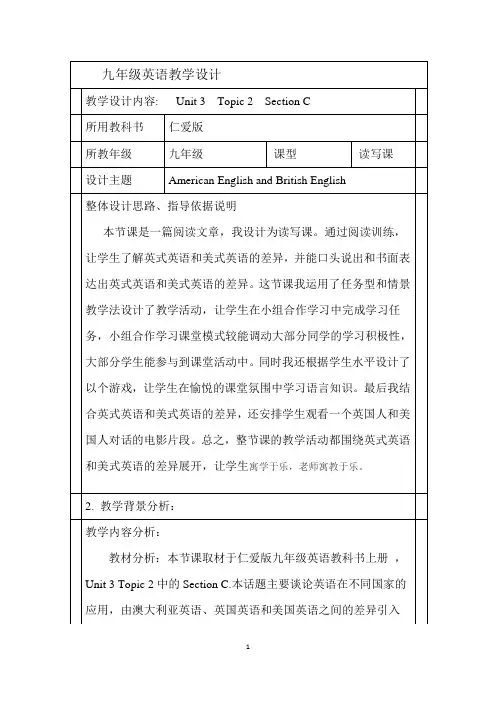
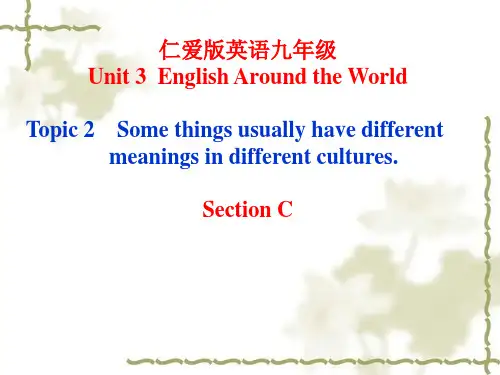
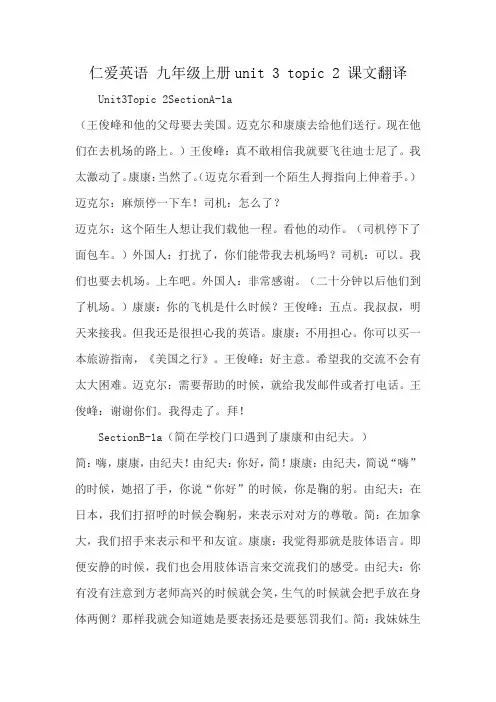
仁爱英语九年级上册unit 3 topic 2 课文翻译Unit3Topic 2SectionA-1a(王俊峰和他的父母要去美国。
迈克尔和康康去给他们送行。
现在他们在去机场的路上。
)王俊峰:真不敢相信我就要飞往迪士尼了。
我太激动了。
康康:当然了。
(迈克尔看到一个陌生人拇指向上伸着手。
)迈克尔:麻烦停一下车!司机:怎么了?迈克尔:这个陌生人想让我们载他一程。
看他的动作。
(司机停下了面包车。
)外国人:打扰了,你们能带我去机场吗?司机:可以。
我们也要去机场。
上车吧。
外国人:非常感谢。
(二十分钟以后他们到了机场。
)康康:你的飞机是什么时候?王俊峰:五点。
我叔叔,明天来接我。
但我还是很担心我的英语。
康康:不用担心。
你可以买一本旅游指南,《美国之行》。
王俊峰:好主意。
希望我的交流不会有太大困难。
迈克尔:需要帮助的时候,就给我发邮件或者打电话。
王俊峰:谢谢你们。
我得走了。
拜!SectionB-1a(简在学校门口遇到了康康和由纪夫。
)简:嗨,康康,由纪夫!由纪夫:你好,简!康康:由纪夫,简说“嗨”的时候,她招了手,你说“你好”的时候,你是鞠的躬。
由纪夫:在日本,我们打招呼的时候会鞠躬,来表示对对方的尊敬。
简:在加拿大,我们招手来表示和平和友谊。
康康:我觉得那就是肢体语言。
即便安静的时候,我们也会用肢体语言来交流我们的感受。
由纪夫:你有没有注意到方老师高兴的时候就会笑,生气的时候就会把手放在身体两侧?那样我就会知道她是要表扬还是要惩罚我们。
简:我妹妹生气的时候就会双臂交叉跺着脚。
康康:我想知道肢体语言在所有文化中是不是同一个意思。
简:我们应该调查一下。
如果人们更加了解肢体语言,就能更好的沟通了。
由纪夫:我们问问方老师和琼斯老师,看她们会不会帮我们做调查。
简:好主意。
再见,康康。
再见,由纪夫。
康康和由纪夫:再见,简。
SectionC-1a有些东西在不同文化中有不同的含义。
这里有一些关于动物的词语,在中国文化和西方文化中用法不同。
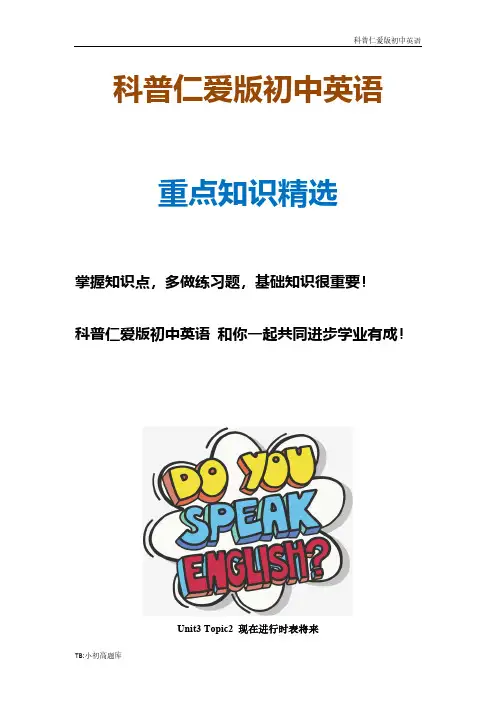
科普仁爱版初中英语重点知识精选掌握知识点,多做练习题,基础知识很重要!科普仁爱版初中英语和你一起共同进步学业有成!Unit3 Topic2 现在进行时表将来一、单项选择题1. Selecting a mobile phone for personal use is no easy task because technology _______ so rapidly.A. is changingB. has changedC. will have changedD. will change2. Rainforests _______ and burned at such a speed that they will disappear from the earth in the near future.A. cutB. are cutC. are being cutD. had been cut3. He_______ of how he can do more for the people.A. had always thoughtB. is always thinkingC. has always been thoughtD. thinking always4. I want to know when he _______ for New York tomorrow.A. has leftB. is leavingC. had leftD. has been leaving5. —My car ________. Could you please give me a ride tomorrow?—I’m sorry I can’t. I’m ________ London tomorrow morning.A. is new; leavingB. has broken down; leaving forC. broke; leaving forD. is expensive; leaving6. The old man is putting out his hand and it seems that he is ________ for a ride.A. wantingB. would likeC. askingD. preferring7. Please hurry up! Flight 237 ________ at two o’clock.A. are flying to LondonB. flying to LondonC. flies to LondonD. is flying to London8. Jane isn’t here at the moment. She ________ later.A. comeB. comesC. has comeD. is coming9. —Why are you so excited today?—We are going ________ a picnic this weekend.A. haveB. to haveC. havingD. had参考答案及解析1. A 认真分析语境可知,该句虽不强调科技此时此刻正在发展,但却强调现阶段正高速发展,因此应使用现在进行时。
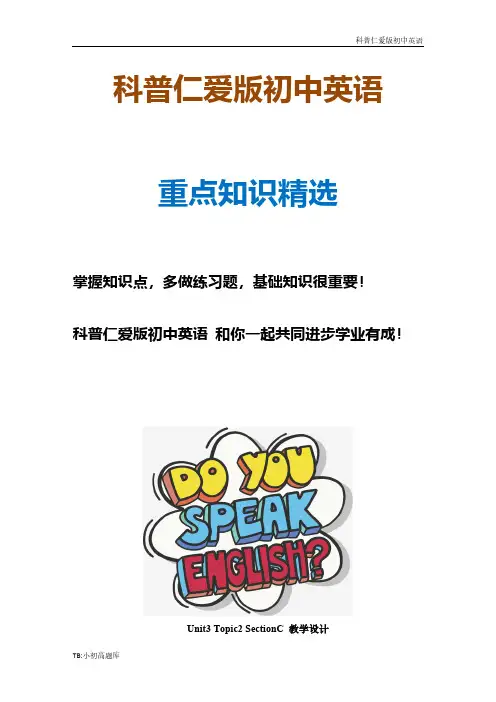
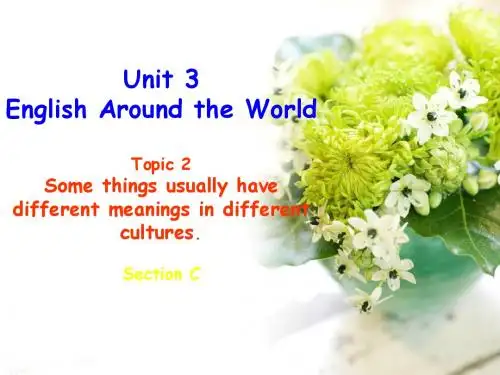
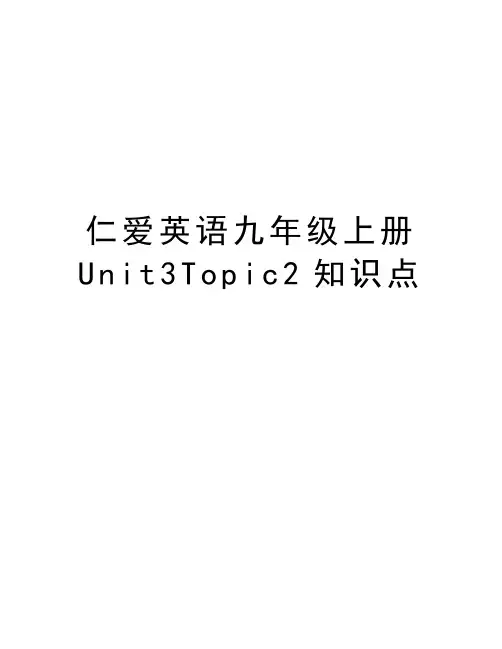
仁爱英语九年级上册U n i t3T o p i c2知识点九年级上册32知识点1..点拨:不同(可数名词)拓展:不同的不同地常用词组:…… …和…之间的不同之处…与…不同练习:a.你能说出他们之间的区别吗? ?b.美式英语与英式英语没有很大差异。
.2. I ’t .译:点拨理解,明白练习:我不太明白他说的话。
I ’ .拓展:遵守规则;跟随;仿效;跟得上练习:1.他拒绝听从我们的劝告。
.2.王老师进入教室,学生们紧跟其后。
. .3.对每个人而言遵守交通规则是很重要的。
’s .3 , ?思考:有关“说”的词汇(说话,说语言); (告诉,讲述); (说…)(谈话)练习: ?.a , .’s , ?4 .拓展: 给某人道歉给某人告别给某人道谢练习:1.因为我的错误我应对他说声抱歉。
I .2.天黑了,我们该互相道声再见了。
’s , ’d .3.帮了我们这么大的忙,请让我们对你说声感谢。
’s .5 .. 精确的. 精确地()不完全一样6.() .7., I , .长筒靴, 行李箱(英)点拨: (过去)曾经,有一次(副词) 链接:一旦一次(副词)练习:写出的意思: , ., .a .8 .9 , I’m .现在进行时态表将来多位于位移动词:, , , , , , 等。
: 他们下周将要去日本。
.1).你什么时候动身? ? 2).我要走了。
I .3).王叔叔要来吃晚饭。
.4).妈妈今天下午去香港。
.5).我明天飞罗马。
I .拓展:某些非位移动词亦可用现在进行时表将来:, , , , , , 等。
10 !1112 .13 a .14 , .点拨: + 过去分词使某人或某物被…’t .. I ’t .链接: . 让(使)某人做某事形容词使某人/某物成…状态名词选某人为…练习: () () ( ).() () .c.切洋葱让我流泪。
.d.我们选他做班长。
.e.烧菜的味道令我感到肚子饿。
.实义动词. .:这个房间需要打扫。
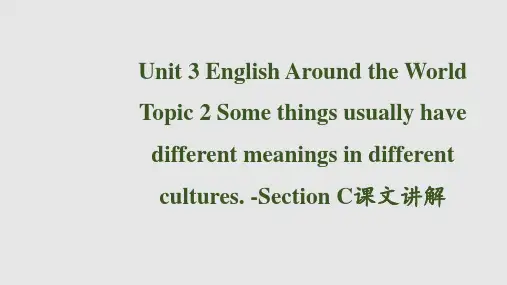
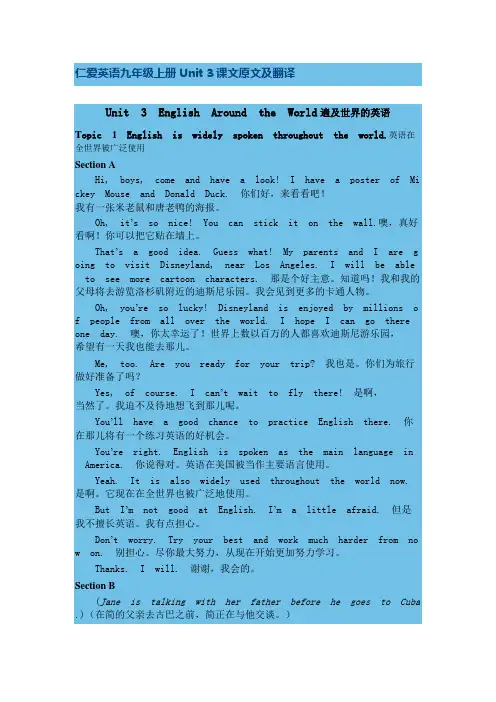
仁爱英语九年级上册Unit 3课文原文及翻译Unit 3 English Around the World遍及世界的英语T opic 1English is widely spoken throughout the world.英语在全世界被广泛使用Section AHi, boys, come and have a look! I have a poster of Mi ckey Mouse and Donald Duck. 你们好,来看看吧!我有一张米老鼠和唐老鸭的海报。
Oh, it’s so nice! You can stick it on the wall.噢,真好看啊!你可以把它贴在墙上。
That’s a good idea. Guess what! My parents and I are g oing to visit Disneyland, near Los Angeles. I will be able to see more cartoon characters. 那是个好主意。
知道吗!我和我的父母将去游览洛杉矶附近的迪斯尼乐园。
我会见到更多的卡通人物。
Oh, you’re so lucky! Disneyland is enjoyed by millions o f people from all over the world. I hope I can go there one day. 噢,你太幸运了!世界上数以百万的人都喜欢迪斯尼游乐园,希望有一天我也能去那儿。
Me, too. Are you ready for your trip? 我也是。
你们为旅行做好准备了吗?Yes, of course. I can’t wait to fly there! 是啊,当然了。
我迫不及待地想飞到那儿呢。
You’ll have a good chance to practice English there. 你在那儿将有一个练习英语的好机会。
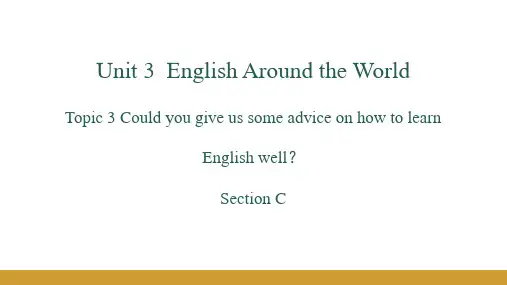
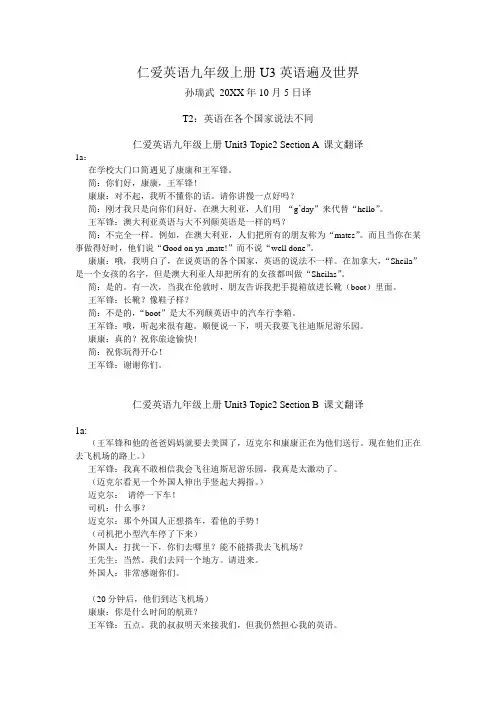
仁爱英语九年级上册U3英语遍及世界孙瑞武20XX年10月5日译T2:英语在各个国家说法不同仁爱英语九年级上册Unit3 Topic2 Section A 课文翻译1a:在学校大门口简遇见了康康和王军锋。
简:你们好,康康,王军锋!康康:对不起,我听不懂你的话。
请你讲慢一点好吗?简:刚才我只是向你们问好。
在澳大利亚,人们用“g’day”来代替“hello”。
王军锋:澳大利亚英语与大不列颠英语是一样的吗?简:不完全一样。
例如,在澳大利亚,人们把所有的朋友称为“mates”。
而且当你在某事做得好时,他们说“Good on ya ,mate!”而不说“well done”。
康康:哦,我明白了,在说英语的各个国家,英语的说法不一样。
在加拿大,“Sheila”是一个女孩的名字,但是澳大利亚人却把所有的女孩都叫做“Sheilas”。
简:是的。
有一次,当我在伦敦时,朋友告诉我把手提箱放进长靴(boot)里面。
王军锋:长靴?像鞋子样?简:不是的,“boot”是大不列颠英语中的汽车行李箱。
王军锋:哦,听起来很有趣。
顺便说一下,明天我要飞往迪斯尼游乐园。
康康:真的?祝你旅途愉快!简:祝你玩得开心!王军锋:谢谢你们。
仁爱英语九年级上册Unit3 Topic2 Section B 课文翻译1a:(王军锋和他的爸爸妈妈就要去美国了,迈克尔和康康正在为他们送行。
现在他们正在去飞机场的路上。
)王军锋:我真不敢相信我会飞往迪斯尼游乐园,我真是太激动了。
(迈克尔看见一个外国人伸出手竖起大拇指。
)迈克尔:请停一下车!司机:什么事?迈克尔:那个外国人正想搭车,看他的手势!(司机把小型汽车停了下来)外国人:打扰一下,你们去哪里?能不能搭我去飞机场?王先生:当然。
我们去同一个地方。
请进来。
外国人:非常感谢你们。
(20分钟后,他们到达飞机场)康康:你是什么时间的航班?王军锋:五点。
我的叔叔明天来接我们,但我仍然担心我的英语。
康康:没关系的,你可以买一本美国旅游指南。
Unit 3 Topic 2 课文翻译S ectionA-1a(Wang Junfeng and his parents are going to the USA. Michael and Kangkang are going to see them off. Now they are on their way to the airport.)(王俊峰和他的父母要去美国。
迈克尔和康康去给他们送行。
现在他们在去机场的路上。
)Wang Junfeng:I can't believe that I'm flying to Disneyland. I'm so excited.王俊峰:真不敢相信我就要飞往迪士尼了。
我太激动了。
Kangkang:Of course you are.康康:当然了。
(Michael sees a stranger putting out hand with his thumb raised.)(迈克尔看到一个陌生人拇指向上伸着手。
)Michael:Stop, please!迈克尔:麻烦停一下车!Driver:What's up?司机:怎么了?Michael:The stranger is asking for a ride. Look at his gesture!迈克尔:这个陌生人想让我们载他一程。
看他的动作。
(The driver stops the minibus.)(司机停下了面包车。
)Foreigner:Excuse me, could you please give me a ride to the airport?外国人:打扰了,你们能带我去机场吗?Driver:Sure. We're going to the same place. Get on, please.司机:可以。
我们也要去机场。
上车吧。
Foreigner:Thank you very much.外国人:非常感谢。
仁爱英语九年级上册
Unit3 Topic2 Section C学案
一、学习目标
掌握以下的单词、短语和句子:
1. Some words: differently, negative, consider, honest, positive, ancient, magical,
creature, compare, courage, underline, pride
2. Some phrases: at times, stand for, regard/consider …as, make mis takes,
compare…to, compare …with
3. Some sentences:
①The ancient emperors compared themselves to dragons.
②The rose is regarded as a symbol of love.
二、学习策略
1. 在遇到含有动植物的英语句子时,不能按照字面意思去理解。
2. 在平常的学习中要多收集、整理与动植物相关的习语。
三、课前预习
在文中找到并划出下面的短语。
1.有时______________________________
2.被视为/当作_______________________________________
3.人人皆有得意时_____________________________________
4.把……比作……______________
5.……的象征_____________
6.代表_____________
7.注意/留心______________
8.狗拿耗子多管闲事_______________________
四、课堂教学过程
Activity1:读前(Pre-reading)
Read1b. Guess what this passage is mainly about.
Activity2:读中(While-reading)
Task1. Fast reading
Skim the passage in 1a, underline the names of animals and plants. Then
do1b.Check the answers.
Task2. Careful reading
Read Para.2 carefully and guess the meaning of each phrase about dogs in
pairs.
Task3. Careful reading
Read Para.3 carefully and mark T (true) or F (false).
( )1.Dragons play an important role in Chinese culture.
( )2.In ancient times, the Chinese emperors compared themselves to
dragons.
( )3.In western cultures, dragon has positive meanings.
Language points:
The ancient emperors compared themselves to dragons.
古代的皇帝把自己比作龙。
compare…to…把……比作……
compare…with…把……和……作比较
①他在诗中把那姑娘比喻成月亮。
He ________ the girl ____ the moon in the poem.
②如果把他俩的工作作比较,你就会发现她的好很多。
If you ______________________, you’ ll find hers is much better.
Task4.Careful reading
Read Para.4 carefully and choose the right answers.
( )1. Rose ____ in Chinese culture and western cultures.
A. has similar meanings
B. has different meanings
C. has negative meanings
( )2. Rose stands for the following except ___________.
A. love
B. peace
C. good luck
D. courage
Activity3读后(Post-reading)
Task1. Read 1a again. Then complete the table in 1c.
Task2. Retell the content of 1a based on the table in 1c.
Task3. Complete the sentences with the correct forms of the given words.
Task4. Read the words in 3 and learn some new words .
Task5. Discussion.
How to write a good composition?
Task6. Write a passage with the title“Different Cultures, Different Meanings”
based on the table in 3.
五、达标测评
1. Dragon _______________(被当做)the symbol of Chinese nation.
2. If you ___________________(多注意)what the teacher says in class, you
will not ____________________ ( 犯相同的错误).
3. We usually _____________ life _______ stage.( 把…比作).
4. Bamboo _______________ (代表)wisdom and power in Chinese culture.
5. I usually go to the movies with my parents, but ________ alone(有时).
6. My sister ___________ (leave) for Paris in a few days.。